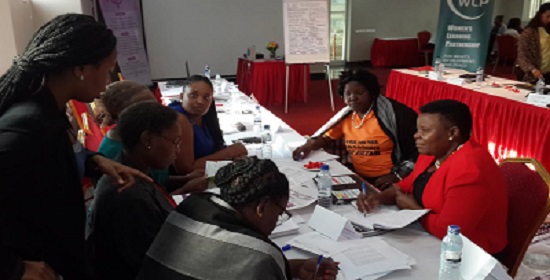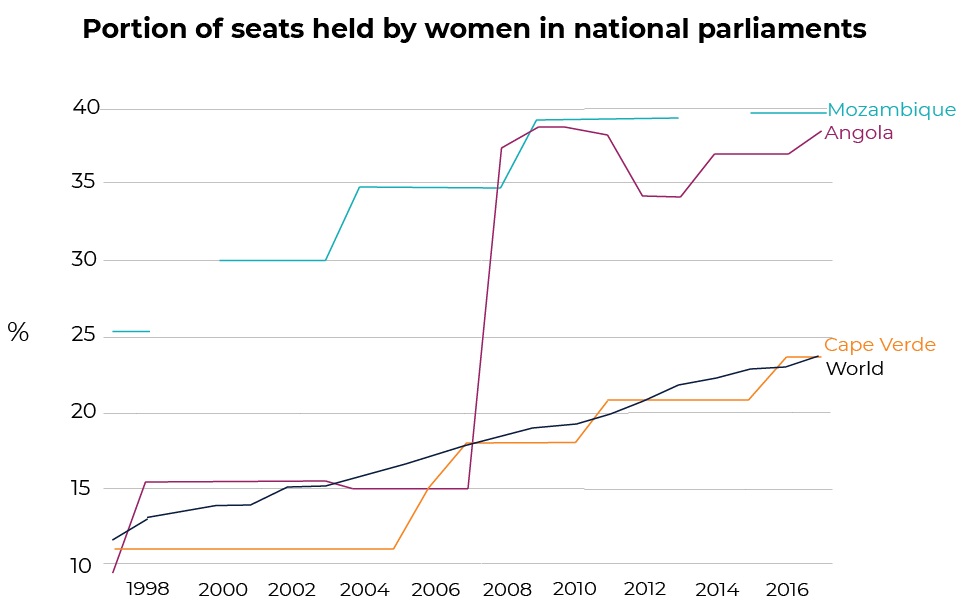
WLP’s partner in Mozambique, Forum Mulher, hosted the “Lusophone Africa Regional Training of Trainers (TOT) for Women’s Leadership and Political Participation” from May 25 to 30, 2015 in Mozambique’s capital city, Maputo. Activists, parliamentarians, trade unionists, and lawyers from three Portuguese-speaking African countries—Mozambique, Angola, and Cape Verde—participated in sessions on eliminating gender-based violence (GBV) and increasing women’s access to decision-making positions. Andrea Romani of WLP’s partner in Brazil, CEPIA, co-facilitated the TOT with trainers from Forum Mulher.
Facilitators used WLP’s manual on ensuring women and girls’ freedom from violence, Victories over Violence, to address the issue of GBV in their own cultural contexts. Reflections on the manual’s case studies led to discussions on the ways violence against women persists in the participants’ respective communities. For example, ritos de iniciação, or initiation rites, in Mozambique and Angola play a crucial role in passing down gender roles from one generation to the next. Initiation rites usher boys and girls into adulthood through a series of traditional ceremonies that often teach valuable sex education, but also reinforce patriarchal structures that place girls in subservient roles at home, and can subject women and girls to harmful practices such as forced marriage, early marriage, and other forms of violence.

Recognizing that women’s involvement in decision-making is crucial to making progress on GBV and other issues, the TOT also focused on strategies for mobilizing women’s political participation. Facilitators guided sessions on engaging in the political process through traditional political parties, as well as independently. Participants learned strategies on how to tackle the issue of women’s low representation in government. Worldwide, women hold an average of just 23.6 percent of seats in national parliaments. Cape Verde’s ratio of women parliamentarians reflects that average, while in Mozambique and Angola women hold 39.6 and 38.2 percent of seats, respectively.
Representation of women in government does not automatically lead to equal rights for women in society, however. Participants at the TOT discussed the barriers to women’s involvement in politics, such as negative stereotypes and a lack of funding sources, as well as ways to overcome these barriers. WLP’s political participation training aims both to empower women to reach decision-making positions, and to inspire men and women in those positions to promote women’s advancement and feminist ideals in their policy agendas.
An enduring outcome of the TOT was a sense of solidarity and commitment among participants to continue to work together. By sharing their experiences, participants strengthened their networks and created plans for future collaboration. They committed to organizing step-down workshops by December 2015, which will spread the WLP methodology and knowledge they acquired to their respective communities and organizations. WLP Brazil and WLP Mozambique will continue to work together to mentor and follow up with the participants as they carry out their action plans.
Related Content
Elevating Women's Voices in the Fight for Land Rights and Climate Justice: An Interview with Nzira Deus
Last week, governments, development partners, civil society, scholars, and private sector representatives convened at the World Bank Land Conference in Washington DC, to discuss research, critical issues, and policy related to the land sector. This year's theme, "Securing Land Tenure and Access for Climate Action," emphasized the often-overlooked role of land tenure in climate change adaptation and mitigation. Nzira Deus, Executive Director of WLP’s partner in Mozambique, spoke at the conference about how civil society organizations in Mozambique are bridging the gap between policy commitments and ground-level change, especially when addressing the barriers women face in accessing land rights.
Moroccan women’s rights activists use the 68th Commission on the Status of Women to call for another historic reform of the country’s Family Code
In 2004, after decades of advocacy by women’s and human rights groups, Morocco’s Parliament adopted a new Family Code, called the Moudawana. The 2004 Moudawana reform was considered one of the most important family law reforms for women’s rights in the MENA region. The legislation recognized women’s right to self-guardianship, child custody, and raised the legal age of marriage.